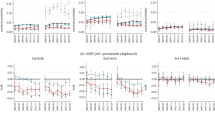Abstract.
The unemployment rate in Spain has been exceptionally high for more than two decades by now. During the same period the fertility rate dropped dramatically reaching the lowest level in the world. In this study we look for evidence of a link between the `unemployment crisis' and the `fertility crisis' in Spain. We examine the factors that affect individuals' ages at marriage and childbirth, focusing on the effects of male employment status. Our results show that spells of non-employment have a strong negative effect on the hazard of marriage. We also find negative (but smaller) effects of part-time or temporal employment on the hazard of marriage. The estimated direct effects of joblessness and part-time work on birth hazards conditional on marriage are smaller and/or not significant for most birth intervals and sample groups. Simulations based on the estimated models confirm the potential for large `delaying' effects of joblessness on marriage. However, the delaying effect is not so large in simulations which control for the actual incidence of non-employment in the sample.
Similar content being viewed by others
Author information
Authors and Affiliations
Additional information
Received: 7 January 1999/Accepted: 7 March 2000
Rights and permissions
About this article
Cite this article
Ahn, N., Mira, P. Job bust, baby bust?: Evidence from Spain. J Popul Econ 14, 505–521 (2001). https://doi.org/10.1007/s001480100093
Issue Date:
DOI: https://doi.org/10.1007/s001480100093




